223 Search Results for partner strategies
August 24, 2013
by Robin Parker -
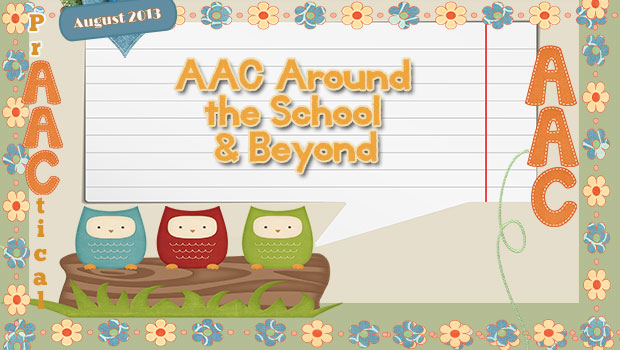
For the August Strategy of the Month, we have been thinking, writing, & talking about AAC in School. School is where AAC learners spend a large portion of their days. There needs to be multiple opportunities for students to USE and LEARN AAC each day. More than that though, we strive for full participation and interaction for students who use AAC. Students should not have to prove that they can do these things before they have ACCESS to AAC strategies and intervention. Here are some things that can be done to help build AAC participation for both students and educators. Provide ACCESS to AAC devices and visual supports throughout ALL activities in ALL places in school and on school sponsored trips/community based instruction. Provide Aided Language Input when teaching AAC to students. Use a Core Word approach when teaching AAC to students but don’t forget about Fringe Vocabulary. Learn and use partner assisted communication... [Read More...]
August 3, 2013
by Carole Zangari -
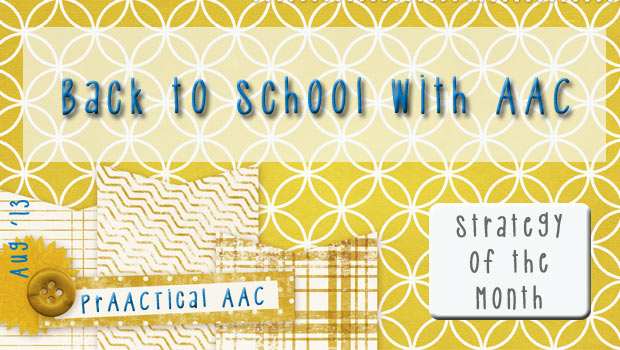
Here in the US, August is Back-to-School month. Throughout this month, we’ll try to post ideas and resources to help make the transition back to school a smooth and successful one. One of the most important things for students who use AAC is having their SLPs, teachers, and families on the same page. They each have a different but very intense relationship with the student’s AAC system. Here are some prAACtical thoughts on getting everyone on the same page. 1. Develop a communication profile of the student: In the initial weeks, try to get a baseline of how the student is communicating at the start of the year. For beginning communicators, we track things like their communicative intents (WHY they are communicating), modalities (HOW they are communicating), and the frequency of their communication. We’ve written about one of our favorite tools for this, the Communication Matrix. 2. Share what you know:... [Read More...]
July 27, 2013
by Carole Zangari -
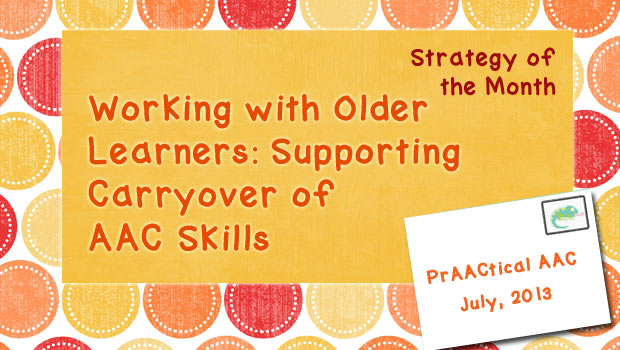
One of the biggest challenges that SLPs face is how to help the communicator use new skills outside the therapy room. Whether the client is someone who stutters, has voice problems, or any other speech-language difficulty, the question is the same: How can we get the client to use skills that were learned and practiced in a therapeutic situation to use those same skills at home, in school, and in the community? It’s an issue with all learners, but for adolescents and adults, we seem to be playing ‘catch up’ all the time. Plus, they are encountering greater numbers of less familiar communication partners and have to fend for themselves more often, making skill generalization even more of a critical topic. Much has been written about problems of generalization by using loose training, and varying the instructional setting, partners, instructions, prompts, and materials. In our way of thinking, it starts... [Read More...]
July 18, 2013
by Carole Zangari -
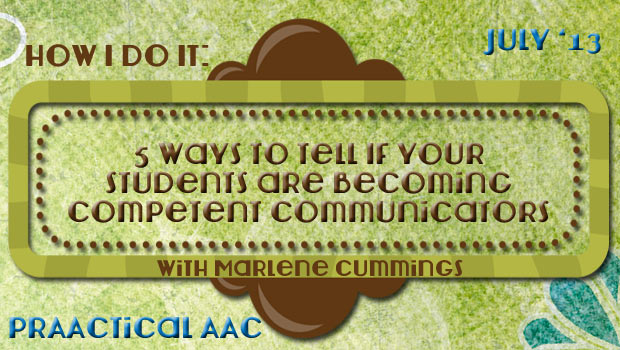
It’s always a good day when we get to share the thoughts of veteran AAC SLP, Marlene Cummings. In this post, Marlene talks about the signs to look for as clients gain skills with AAC and wraps up her series of posts on her yearlong experience in providing embedded professional learning experiences in Oakland Schools. You can see her earlier posts on cultivating the right mindset, their framework for AAC success, her AAC implementation toolbox, and the communication environment. 5 things in our “Destination Toolbox” “Are we there yet?” or “Five Ways to Tell That Your Students are Becoming Competent Communicators” Students are: Participating in the purposes of communication by novelly generating multiple word phrases demonstrating a variety of communicative functions Taking multiple communicative turns with multiple partners in multiple environments Using words from many different word classes Using words to talk about words Using language to communicate and communicating to learn... [Read More...]
July 13, 2013
by Robin Parker -
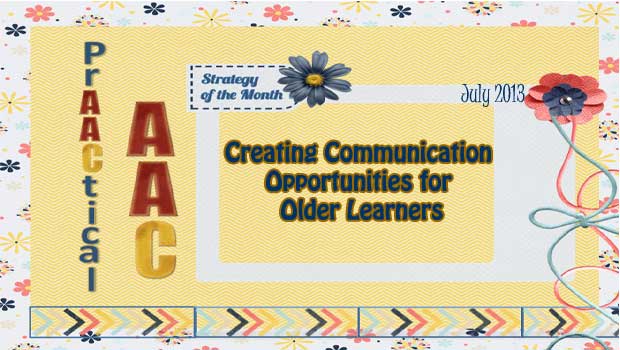
The Strategy of the Month involves AAC and the ‘older learner’. The ‘older learner’ involves a range of ages (We are ‘older learners’ for way longer than we are children) as well as a wide range of functioning levels. Even with this variation though, we know that ALL older learners can learn. There are challenges with ‘older learners’ that need to be addressed in order to facilitate spontaneous and generative communication and language. The challenges may result from years and years of going to intervention (some of it effective, some not), from perceived failure by the learner and/or the professionals, or may even just be related to that ‘teenager or adult’ independent streak. These challenges can definitely be overcome in order to help develop a functional and robust communication system for ALL learners. Just remember respect the learner as a competent teenager or adult (e.g., think what a typical language... [Read More...]
July 6, 2013
by Carole Zangari -
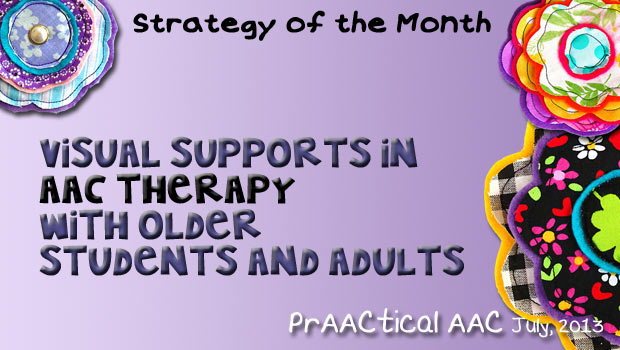
When learners are still struggling with communication in their teenage years and beyond, it means we have a lot of catching up to do. There are lots of implications for us as SLPs, of course, but the main one is this: Every interaction should have a purpose. As we head to the waiting room or classroom to see this student, we’re focused on how we can elicit practice on meaningful skills in the next few minutes. On a good day, we can use these few minutes before the session productively. Before we get to the therapy room we try to: use expectant pauses and graduated prompting to elicit a greeting at his/her highest level engage him/her in conversation to practice social exchanges provide opportunities for him/her to respond to a non-obligatory communicative context and facilitate a response make basic requests, like asking for help to open the door that we’ve... [Read More...]
July 5, 2013
by Robin Parker -
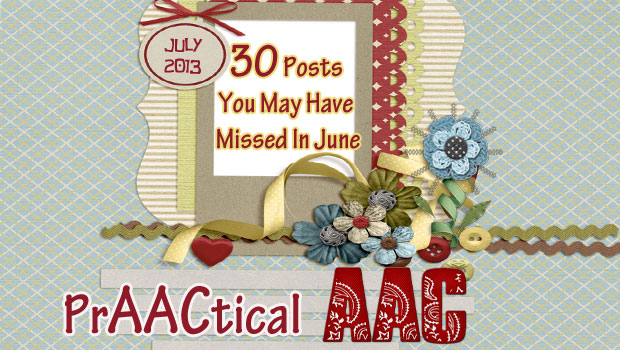
Strategy of the Month AAC Assessment for People with Aphasia Communication Books & Aphasia Speech Supplementation Strategies Aphasia, Supported Communication, Written Choice Strategy, + Variations Making it Work: 6 AAC Strategies for People with Aphasia PrAACtical Thinking Be Chatty: 5 Tips for Supported Conversation 5 PrAACtical Thoughts on Catch-Up Conversations 31 Posts You May Have Missed in May Where to Get PrAACtical Research Reviews Supporting the Use of AAC Listen to Me About What I Need and Want It’s PrAACtically Fathers Day PrAACtical Summer Learning 5 Questions about Aphasia & Communication Books Safety Matters: 5 Resources for People Who Use AAC Weighing The Evidence PrAACtical Evidence on Presuming Competence Helping People with Aphasia Compensate for Their Language Difficulties with Dr. Kristy Weissling PrAACtical Summer Activities AACtual Therapy/ How I Do It Go Fish with AAC and Shareka Bentham Marlene Cummings Shares and Implementation Toolbox Use your Best Spud to Teach Vocabulary... [Read More...]
June 26, 2013
by Carole Zangari -
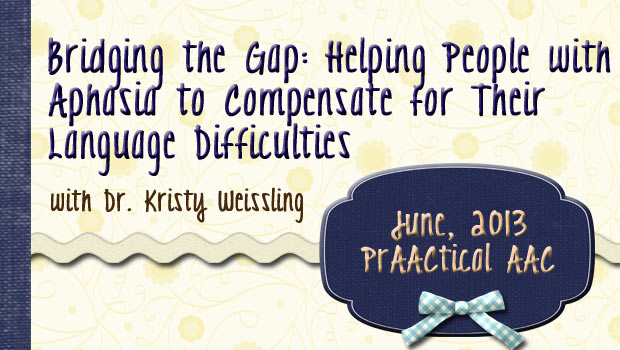
We’re wrapping up Aphasia Month with another fine post from Dr. Kristy Weissling. You can see her earlier posts here and here. In this post, Kristy shares her thoughts on how SLPs can use AAC supports to help individuals with aphasia compensate for their language difficulties. In 2010, my colleague, Carrie Prentice, and I talked about the role of both remediation and compensation in the speech rehabilitation programs of people with aphasia. At that time, we were trying to emphasize that at any particular time in the rehabilitation process, from acute care to outpatient rehabilitation, all possible alternatives should be balanced to create an individualized treatment program. Both restorative and compensatory mechanisms are available to therapist throughout this process. We proposed the work of Dixon, Garrett, and Backman (2008) to formulate a framework for discussing compensation. Six mechanisms of compensation were identified in their chapter on principles of compensation in... [Read More...]
June 22, 2013
by Robin Parker -
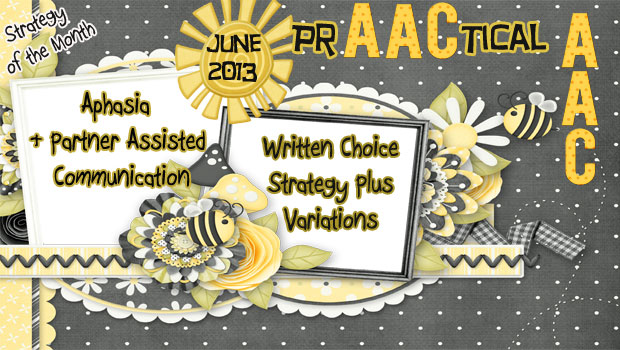
This month, we have enjoyed writing about communication strategies for aphasia. Partner supported communication is the platform for many of the effective techniques we use to help people with aphasia initiate, maintain, or terminate communication and conversation. We have talked about assessment strategies, communication books, and alphabet & topic supplementation. Now it is time to discuss the written choice strategy. The written choice strategy is fairly easy to implement, can look natural, and can result in seamless detailed conversation. Written choices are provided in the context of conversation and are displayed in an organized manner. What is It? The written choice strategy has the partner/facilitator generating written key-word choices that relate to the conversational topic. The written choices can be paired with text, pictures, drawings, symbols, and natural speech. The partner/facilitator writes possible answers to conversational questions in list form. The conversation is extended as continued written choices are offered... [Read More...]
June 8, 2013
by Robin Parker -
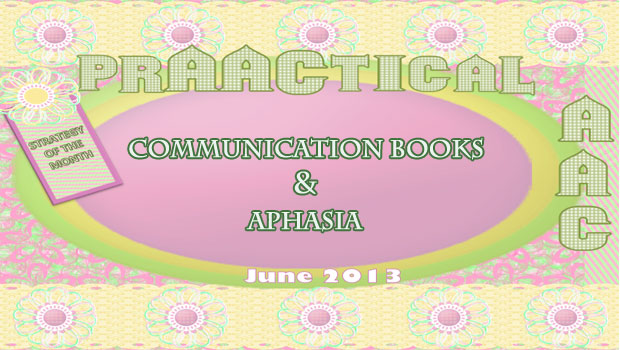
We know aphasia intervention has moved well beyond traditional speech and language training and intervention. We are so happy it has moved to an authentic participation, functional communication, and social interaction focus. Communication books are one tool for helping people with aphasia be active participants in conversation and comprehensive communication. Here are some thoughts and ideas about communication books to get started. Communication Books- Communication books for adults with aphasia can be in grid format with relevant communication messages. There can be a few pages or many, but keep in mind that the more pages, the longer it will take to navigate. It is most important to include high priority and relevant messages that will support needed communication and not just ‘standard’ messages. There are many samples and templates that can be purchased or downloaded for adult communication books. These may be good as a start, but should be individualized when... [Read More...]









